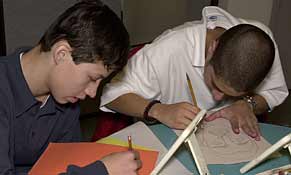
Lesson plan based on Cycladic Figure
Analyze and evaluate the effects of abstraction and realism on depictions of the human form in ancient and modern—day cultures.
Skills and Focus: Art Appreciation, Studio
Subject Area: Fine Arts
Thematic Connection: Connecting Past and Present
Grade Level: Secondary School
Time Needed: 20 min. for discussion, time for studio projects
Objectives
• Recognize and discuss the use of abstraction in the Cycladic figure and realism in the Attic Stele.
• Analyze how the use of abstraction and realism affects the meaning and ideas conveyed in each object.
• Create an abstract self-portrait and a realistic self-portrait using drawing materials.
• Evaluate how the use of abstraction or realism affects the choices and decisions artists make during the creative process.
Instructional Materials Needed
Stories: Who Is This?, The Human Form in Cycladic Art , and What Is Shown Here?, which discusses the Attic Stele
Drawing or construction paper
Pencils or pastels
Mirrors

Activity
Step 1: While both the Cycladic figure and the Attic Stele depict the human form, one is abstract and one realistic. Discuss the characteristics of each object.
Critical Thinking Ask students to
• explain the roles line and shape play in the creation of a form.
• describe how artists depict volume.
• describe the details that appear in each object.
• explain how the details are added.
Step 2: Instruct students to create an abstract self—portrait using pencils or pastels. Students should concentrate on the use of shape and line in the portrait to depict the essence of the human form.
Step 3: Now students should create a realistic self—portrait with the same materials, concentrating on the use of volume and personal details to create a recognizable image.
Critical Thinking Ask students to
• analyze and explain how the decisions and processes they use differ as they create each self—portrait.
Goals
This activity meets Illinois State Goal 25: Know the language of the arts.
This activity meets Illinois State Goal 26: Through creating and performing, understand how works of art are produced.
© 2000, by The Art Institute of Chicago. All rights reserved. Use of this program is subject to the terms below. No part of this program may be reproduced, transmitted or distributed in any form or by any means, except for personal or classroom use. All Copyright in and to the program, in whole or in part, belongs to the publisher and its licensors and is registered with the U.S. Copyright Office